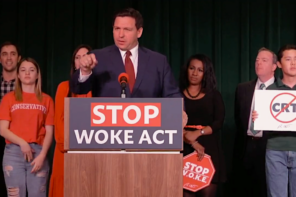Congressman Heath Shuler is best known for a few things: his NFL career, his challenge of Nancy Pelosi for House Democratic Leadership, and his co-sponsorship of anti-abortion bills. Once lauded as a new breed of Democrat, able to win in a ‘red’ district by running to the right of the party, it now looks as though the conservative evangelical “Blue Dog” Democrat may be on his way out.
If he opts to run for reelection in 2012 Shuler will face a primary challenge for his seat in North Carolina’s 11th District from a self-proclaimed progressive Democrat who is probably best known for being an atheist city councilman in a state that still requires government officials to believe in “Almighty God.” And if Shuler can fend off a primary challenge, he may still lose the support of his right flank to a newly-drawn district that’s even more conservative than before.
The incumbent’s primary challenger, Cecil Bothwell, actually prefers the term “non-theist” to “atheist.”
“I know that some atheists feel that stance ducks the issue and that we should force the issue,” he says, “But my ethical/spiritual beliefs ought not to be of any import in holding public office. I’m not in any way running as an ‘atheist.’”
But that hasn’t stopped efforts by others to use his beliefs to gain political points. During his Asheville City Council campaign in 2009, two direct mailings were sent around warning voters of his non-belief, and after his election opponents tried to prevent him from being sworn in. The US Constitution, of course, forbids religious tests for office; so the former green builder, journalist, and author (of a political biography of preacher Billy Graham) was able to take his seat.
A challenge to Heath Shuler would likely bring religion to the fore for Bothwell once again as Shuler’s religious beliefs have played a role both in stoking constituents’ anger and in Bothwell’s decision to challenge him in 2012.
Feminists are angry with Shuler for his position on abortion and his role in co-sponsoring bills that would defund Planned Parenthood and other family planning organizations, that would further restrict abortion access, narrow the rape exception that allows women seeking abortions to access federal funds, and allow hospitals to turn away women who need emergency abortion services. Shuler supported H.R. 3, for example—the controversial bill that once included a clause that would limit abortions paid for with government funds to victims of “forcible rape.”
And GetEQUAL NC, the North Carolina branch of the national organization advocating for (and taking direct action in support of) equality for gay, lesbian, bisexual and transgender people, has had run-ins with Shuler over his opposition to the Employment Non-Discrimination Act and marriage equality.
Angel Chandler, an organizer with GetEQUAL NC, says, “During a meeting GetEQUAL NC had with him in May of this year, Rep. Shuler clearly stated that he would not support any legislation that ‘classified’ the LGBT population as a class of citizens with protected rights. When asked what reason he had for not wanting to give LGBT citizens protections under the law he answered, ‘My beliefs.’”
She continues, “North Carolina deserves to have someone in Washington who does not discriminate against a segment of the population he or she represents due to his or her religious ‘beliefs.’ Rep. Shuler has shown his inability to separate his own beliefs from the work at hand on behalf of all North Carolinians; it is time to look elsewhere.”
“I have deep philosophical differences with Shuler on health care, economics, corporate welfare, and defense spending. His vote to defund Planned Parenthood and his co-sponsorship of a bill that redefined rape were the triggers that made me decide to replace him in Washington,” Bothwell says. “The principal area in which his religion played a part was in his imposition of his views concerning family planning and women’s right to choose. As a member of The Family/C-Street group, he seems to subscribe to the view than men should tell women what they can or cannot do with their bodies.”
Shuler is one of the few Democratic members of The Family, the organization described by The New Yorker as a “frat house for Jesus.” The Family has ties to Ugandan anti-gay legislation, as well as to unsavory governments around the world.
Jeff Sharlet, in his 2008 book The Family, describes their theology:
It’s Protestant, to be sure, though there are Catholic members. Its leadership regards with disdain not only the mainline denominations, but also evangelicals they consider ‘lukewarm.’… “They take the same approach to religion that Ronald Reagan took to economics,” says Neil MacBride, a political liberal with conservative evangelical convictions that put him at odds with the Family’s unorthodox fundamentalism. “Reach the elite, and the blessings will trickle down to the underlings.”
Not exactly the kind of religion practiced by most in western North Carolina, to be sure. As Sarah Posner reported, Heath Shuler was a product of the Democrats’ faith outreach, represented by the Eleison Group a consulting firm, Posner describes as: “focused on making ‘people of faith’ ‘comfortable’ with Democrats, who’ve gotten a bad rap about being ‘hostile’ to religion. That rap, incidentally, came from Democratic ‘faith’ strategists, not because Democrats are demonstrably anti-religion, but it has resulted in some painful pandering to make up for these alleged deficiencies.”
Reaching out to people of faith is one thing, but Shuler has appeared at some deeply conservative religious events at which his own gay and lesbian constituents would not be welcome. Most recently he spoke before the Family Research Council’s Watchmen on the Wall conference for pastors where he asserted that “if Christians ‘had provided for people in our community,’ then we ‘wouldn’t have needed a debate on health care.’”
Asheville, the center of the 11th district, is a fairly liberal place known for its arts scene. Recently, Bothwell and a majority of the City Council appeared in support of a resolution that would give full legal equality to Asheville’s LGBT population. The gathering, hosted by People of Faith for Just Relationships, involved religious leaders from a variety of traditions. In the resolution, introduced in January, the Council notes that Asheville has a concentration of same-sex couples more than three times the national average, and that up to 12 percent of the city’s population are gay, lesbian, bisexual, or transgender. Those residents are likely to consider a candidate’s position on their own rights before his religion.
In 2010, Shuler faced a primary challenge from an unknown, Aixa Wilson, who took 39% of the vote and won Buncombe County (the district’s largest and the county in which Asheville sits) by four points. Wilson had never held office before and, refusing to take donations, had almost no budget. Shuler, who had dodged debates in 2008 against a Republican challenger, skipped a League of Women Voters event rather than debate Wilson. Beating Shuler in Buncombe County is not only possible, then—it’s been done.
It’s the more conservative, rural areas that would likely present a problem for Bothwell. The question remains: Can a progressive Democrat who supports marriage equality and abortion rights be elected in the rural South?
And then there are the new district maps that were released just last week. According to Aaron Blake at The Fix, Shuler now represents the most conservative district in the state. His district (which voted 52 percent for McCain/Palin in 2008) has, with a few redrawn lines on a map, been converted to one that voted 58 percent for the Republican ticket. Blake notes, “There may be a new king when it comes to gerrymandering this cycle, and it’s the North Carolina Republican party.”
And so now the rumors are flying that even conservative Shuler will give up his race and take an easier job—perhaps as athletic director at the University of Tennessee at Knoxville. A Democratic race without the incumbent would likely draw other contenders, though, possibly more conservative Dems eyeballing the district’s sudden rightward shift.
If Shuler does stay in the race to face off against Bothwell, it won’t be the first time that progressive organizers have supported a primary challenger to a conservative Democrat. In 2010, Bill Halter nearly defeated Arkansas’ then-Senator Blanche Lincoln in a run-off. Lincoln, of course, went on to lose her seat to Republican John Boozman by nearly 21 points. Joe Sestak challenged Arlen Specter, who himself had only recently returned to the Democratic Party, and defeated him, though he lost the election to ultra-conservative Pat Toomey, whom Specter had likely left the GOP to avoid in the first place. Sestak’s run, it should be noted, pressed the moderate Specter to stake out positions on several issues, including a position on the war in Afghanistan that was actually to his challenger’s left.
While 2010 was a year of surging conservatives and depressed progressives, it’s not yet clear what 2012 will bring. The only message in the losses of both Sestak and Halter is that Democrats in swing areas were swept out in 2010 whether progressive or not. Shuler’s Blue Dog caucus lost 24 of its 58 House seats in 2010, including Alabama Rep. Parker Griffith who became a Republican, so it’s clear that being conservative didn’t keep them safe. But the party doesn’t necessarily take kindly to insurgent challengers, and with heavy hitters like Bill Clinton and Debbie Wasserman-Schultz having campaigned personally for Shuler in the past (Shuler was recruited by the Clinton-Rahm Emanuel squad to run in the first place), it’s doubtful Bothwell will get much official support for his run. And with an even more conservative district than before, even if Shuler returns to football Bothwell will face a tough fight.
GetEQUAL NC’s Chandler who, like Bothwell, is a volunteer escort at a local family planning clinic that provides abortion services, says “[Bothwell] will likely be attacked at every angle due to his position on LGBT rights, women’s reproductive rights, ending the drug war, and due to his religion or lack thereof.” She continues, “What I hope folks see is Cecil’s commitment to giving people power in their own lives to make their own decisions rather than empowering the government to tell us what we can and cannot do, who we can and cannot have a committed relationship with.”
Bothwell thinks that his message will resonate with rural voters. “So-called conservatism includes a large number of populist and libertarian voters whose real interests are much more closely aligned with progressive politics than with corporatist politics in either major party,” he notes, pointing out that despite being a non-theist, he is an active member of the local Unitarian Universalist church, a member of its Social Justice Council, and the founder of a jail ministry.
He is aware, though, that the smears he faced in 2009 are likely to increase in a messy primary against a well-funded opponent. “I fully expect the issue to be raised during this campaign and I have this to offer: My personal philosophy is rooted in the Golden Rule, and I believe all ethics emanate from that basic stance. It is shared by virtually all religions in the world.”




